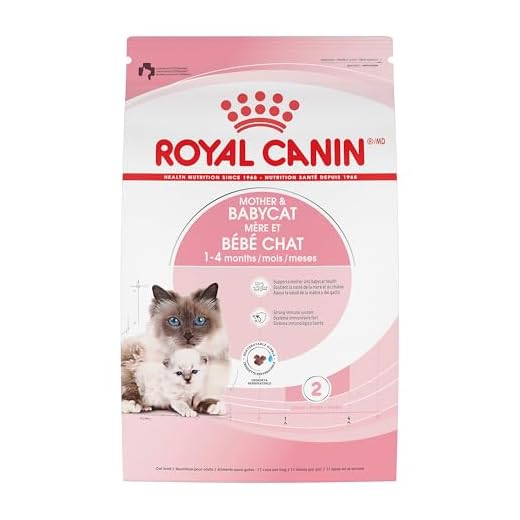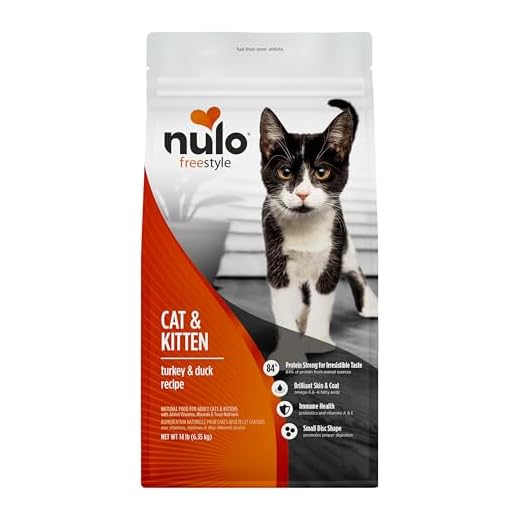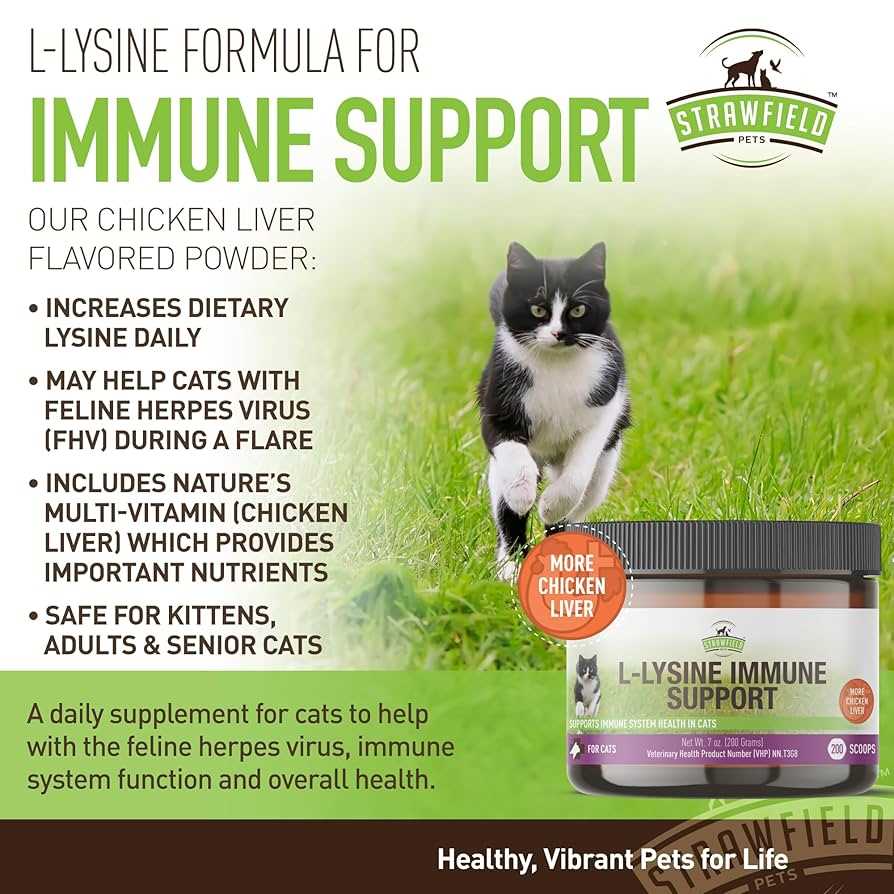




Choosing the right nutrition for pets suffering from herpes virus can significantly impact their health and well-being. This article provides specific recommendations on high-quality nutrition options that cater to the unique needs of these animals. By focusing on essential nutrients, hydration, and easily digestible ingredients, owners can help support their furry companions during challenging times.
The content is tailored for pet owners seeking effective dietary solutions to manage symptoms and boost their pets’ immune systems. It includes insights from veterinarians and nutritionists, ensuring that the suggestions are backed by expertise. Additionally, the piece highlights the importance of consulting with a veterinarian before making any dietary changes.
In this article, you’ll find a curated list of suitable products, along with descriptions of key ingredients that can benefit pets dealing with herpes virus. Each option has been evaluated for quality, palatability, and specific health benefits. By the end, readers will have a clear understanding of how to improve their pet’s diet and overall quality of life.
Best Cat Food for Cats with Feline Herpes
Choosing the right nutrition can greatly impact the well-being of a pet suffering from a viral infection. It is advisable to focus on diets rich in specific nutrients that support the immune system and promote overall health. High-quality protein sources should be prioritized, as they help maintain muscle mass and energy levels.
Incorporating omega-3 and omega-6 fatty acids can aid in reducing inflammation. Ingredients such as fish oil or flaxseed may enhance skin and coat health, which can be particularly beneficial for animals dealing with viral challenges. Additionally, antioxidants like vitamins E and C are important, as they protect cells from damage and support immune function.
Recommended Nutritional Features
- High Protein Content: Look for meat or fish as the primary ingredient.
- Omega Fatty Acids: Include sources like fish oil or flaxseed.
- Antioxidants: Ensure the presence of vitamins E and C.
- Low Carbohydrates: Minimize fillers and grains that may not be beneficial.
Consulting with a veterinarian can provide personalized recommendations tailored to the specific needs of the pet. Transitioning to a new diet should be done gradually to avoid digestive issues. Monitoring the pet’s response to the new nutrition is also essential to ensure it meets their health requirements.
Understanding Feline Herpes: Symptoms and Impact on Diet
Recognizing the signs of herpes virus infection is critical for ensuring the well-being of your pet. Common symptoms include sneezing, nasal discharge, watery eyes, and oral ulcers. These indicators often lead to decreased appetite, making it essential to adjust dietary choices to promote better nutrition and hydration.
Affected animals may experience periods of flare-ups, which can impact their overall health. The stress from these outbreaks may exacerbate the symptoms, further influencing their feeding habits. Adapting the nutritional plan to accommodate these challenges can help maintain their strength and immune function.
Dietary Considerations
When selecting meals for an animal with this condition, consider the following:
- Moisture Content: High moisture levels in meals can aid in hydration, especially if your pet is experiencing difficulty drinking water.
- Soft Textures: Soft or wet options can be easier to consume, particularly if oral ulcers are present.
- Palatability: Choosing flavors that your pet enjoys can stimulate appetite during flare-ups.
- High-Quality Proteins: Ingredients rich in proteins support recovery and overall health.
Incorporating supplements, such as omega-3 fatty acids, may also provide anti-inflammatory benefits, which can be advantageous during flare-ups. Additionally, balancing vitamins and minerals can support a robust immune response.
| Symptoms | Dietary Adjustments |
|---|---|
| Sneezing | Moist meals for easier swallowing |
| Nasal Discharge | Hydrating options to encourage fluid intake |
| Watery Eyes | Soft textures to minimize discomfort |
| Oral Ulcers | Palatable choices to stimulate appetite |
Monitoring your pet’s response to new dietary options is essential. Adjusting the nutritional intake based on their symptoms can significantly enhance their quality of life and support recovery during challenging times.
Key Nutritional Requirements for Cats with Feline Herpes
Optimal nutrition plays a significant role in managing the health of pets affected by viral infections like herpes. A well-balanced diet can support the immune system and help alleviate symptoms associated with this condition.
High-quality protein sources are essential. These proteins should come from animal-based ingredients, providing the necessary amino acids crucial for tissue repair and immune function. A diet rich in taurine, an amino acid found primarily in meat, is particularly beneficial for maintaining overall health.
Additional Nutritional Components
Incorporating specific vitamins and minerals can enhance the nutritional profile:
- Vitamin A: Supports eye health and immune function.
- Vitamin E: Acts as an antioxidant, protecting cells from damage.
- Omega-3 and Omega-6 Fatty Acids: Promote skin and coat health, which can be affected by stress and illness.
Hydration is also vital. Ensure access to fresh water to prevent dehydration, particularly during flare-ups when the appetite may decrease. Wet formulations can help increase fluid intake.
Consideration of specific dietary formulations designed to bolster immunity can also be beneficial. These may include probiotics to support gut health and enhance the immune response.
Regularly monitoring the health and weight of the affected pets is essential, as nutritional needs may change based on their condition and treatment response.
Key Ingredients to Consider in Nutrition for Herpes Management
High-quality protein sources are fundamental in supporting the immune system of animals affected by herpes. Look for options like chicken, turkey, or fish as primary ingredients. These proteins provide essential amino acids that promote recovery and overall health.
Incorporating omega fatty acids, particularly from fish oil or flaxseed, aids in reducing inflammation and enhancing skin and coat condition. These components contribute to a stronger barrier against infections, essential for those dealing with viral challenges.
Additional Nutritional Elements
Besides protein and fatty acids, certain vitamins and minerals play a significant role. Here are some important elements to keep in mind:
- Vitamin A: Supports eye health and immune function.
- Vitamin E: Acts as an antioxidant, protecting cells from damage.
- Zinc: Essential for skin health and immune response.
- Probiotics: Promote gut health and overall wellness, aiding in nutrient absorption.
Choosing options that include these ingredients can significantly impact the well-being of animals dealing with herpes. Always consult a veterinarian for personalized dietary recommendations based on specific health needs.
Recommended Brands Offering Specialized Diets for Affected Cats
When selecting nutrition for animals suffering from viral infections, it is essential to focus on formulas that enhance immune function and promote overall health. Certain manufacturers have developed specialized options tailored to address the unique needs of these pets, often incorporating specific nutrients that support recovery and well-being.
Consider options that feature high-quality proteins, antioxidants, and fatty acids. These elements play a key role in bolstering the immune response and reducing inflammation. Additionally, some brands include ingredients that can help soothe the digestive system, which may be beneficial for animals under stress due to illness.
Key Features to Look For
- High Protein Content: Look for sources like chicken, turkey, or fish to support muscle maintenance.
- Added Antioxidants: Ingredients such as blueberries or spinach can help fight oxidative stress.
- Omega Fatty Acids: Essential for maintaining skin and coat health, as well as reducing inflammation.
- Digestive Support: Probiotics and prebiotics can aid in gut health, which is critical during recovery.
Some brands also offer veterinary diets specifically formulated for pets with viral challenges. Consulting with a veterinarian before making any dietary changes is advisable to ensure the selected product meets the specific health requirements of the animal.
Homemade Recipes Tailored for Feline Herpes
For pets suffering from viral infections, a carefully crafted meal can support their health. Homemade recipes allow for control over ingredients, ensuring a diet rich in nutrients while avoiding potential allergens or irritants. Incorporate high-quality proteins and beneficial supplements to enhance their well-being.
Consider utilizing ingredients like chicken, turkey, or fish as primary protein sources. These proteins should be cooked and finely shredded to facilitate easier digestion. Adding cooked carrots or peas can provide essential vitamins, while a small amount of pumpkin can support digestive health.
Recipe Ideas
- Chicken and Pumpkin Delight:
Mix shredded cooked chicken with pureed pumpkin. Add a dash of fish oil for omega-3 fatty acids, which can help reduce inflammation and support the immune system.
- Turkey and Vegetable Medley:
Combine ground turkey, well-cooked sweet potatoes, and green beans. This combination offers a balanced meal while aiding in digestive health.
- Fish and Rice Bowl:
Use canned tuna or salmon in water, mixed with cooked rice and a little bit of broth. This meal is palatable and provides necessary hydration.
Always monitor your furry friend for any adverse reactions when introducing new ingredients. Consulting a veterinarian before making significant dietary changes is advisable to ensure that meals meet specific health needs.
Incorporating a variety of these recipes can help maintain interest in meals while providing essential nutrients. Remember to maintain proper hygiene when preparing and storing homemade meals.
Consulting with Veterinarians: Choosing the Right Nutrition for Your Feline Companion
Consulting a veterinarian is essential for selecting the most suitable nutrition for your pet suffering from viral infections. Professionals can provide tailored recommendations based on individual health needs, age, and specific symptoms linked to the condition.
When discussing dietary options, consider the following points to ensure a well-rounded approach:
- High-Quality Ingredients: Look for options that prioritize real meat and avoid fillers.
- Immune System Support: Seek out formulations rich in antioxidants, vitamins, and minerals to bolster overall health.
- Moisture Content: Hydration is vital, so consider wet options that help with moisture intake.
- Specific Nutritional Additives: Ingredients like L-lysine can be beneficial in managing symptoms.
- Allergy Considerations: Ensure any food choice avoids allergens that could exacerbate health issues.
Regular follow-ups with your veterinarian can help assess the effectiveness of the chosen diet and allow for adjustments as necessary. A tailored approach, informed by professional guidance, will contribute to your furry friend’s well-being and comfort.
Best cat food for cats with feline herpes
Features
| Release Date | 2023-12-25T00:00:01Z |
| Size | 3 Ounce (Pack of 24) |
Features
| Part Number | 70 |
| Model | 70 |
| Warranty | If you have a question that needs immediate attention, please call (800) 919-2833. |
| Color | Brown |
| Size | 12 Pound (Pack of 1) |
Features
| Part Number | 038100174871 |
| Model | 038100174871 |
| Warranty | Purina guarantees outstanding quality and taste. If for any reason you’re not satisfied, simply let Purina know why. Please contact Purina directly at (800) 778-7462 within 60 days of date on receipt for assistance. Or, feel free to mail your original purchase receipt with the price circled, a brief explanation of why you were dissatisfied with our products, the “Best If Used By” date box from the package, along with your name and street address (P.O. Box not accepted) to: Purina, Consumer Services, PO Box 340, Neenah WI 54957 |
| Color | Variety Pack |
| Size | 3 Ounce (Pack of 24) |
Features
| Part Number | 145006 |
| Model | 145006 |
| Warranty | Contact Royal Canin |
| Size | 6 Pound (Pack of 1) |
Features
| Part Number | 61KT14 |
| Model | 61KT14 |
| Size | 14 Pound (Pack of 1) |
Features
| Part Number | 10137 |
| Model | 10137 |
| Warranty | 100% statisfaction, or your money back |
| Is Adult Product | |
| Size | 15.5 Pound (Pack of 1) |
Features
| Part Number | 800286 |
| Model | 70 |
| Warranty | If you have a question that needs immediate attention, please call (800) 919-2833. |
| Color | Brown |
| Size | 11 Pound (Pack of 1) |
Video:
FAQ:
What are the symptoms of feline herpes, and how can diet help manage them?
Feline herpes virus (FHV) commonly causes upper respiratory issues in cats, leading to symptoms such as sneezing, nasal discharge, and watery eyes. A diet rich in vitamins, particularly vitamin E and A, can support the immune system, which may help reduce the severity and frequency of outbreaks. Additionally, wet food can keep cats hydrated, which is essential during illness. Choosing high-quality cat food that includes these nutrients can be beneficial for cats dealing with feline herpes.
Are there specific ingredients I should look for in cat food for cats with feline herpes?
When selecting cat food for a cat suffering from feline herpes, look for ingredients that are high in protein and low in fillers. Ingredients such as chicken, turkey, or fish are excellent protein sources. Additionally, consider foods that include antioxidants like blueberries or cranberries, which may support immune health. Omega fatty acids, often found in fish oil, can also be beneficial for skin and coat health, which is crucial during viral infections.
Can I feed my cat homemade food if it has feline herpes?
Yes, you can prepare homemade food for a cat with feline herpes, but it’s essential to ensure the diet is balanced and meets all their nutritional needs. Consult with a veterinarian or a pet nutritionist to create a suitable meal plan that incorporates high-quality proteins, essential vitamins, and minerals. Homemade diets can be beneficial as they allow you to control the ingredients, but they should be carefully formulated to avoid nutrient deficiencies that could affect your cat’s health.











